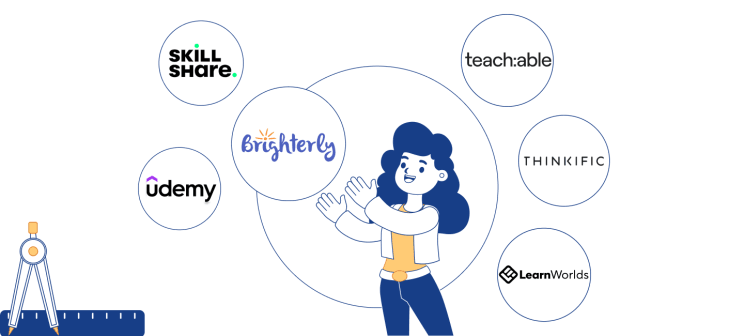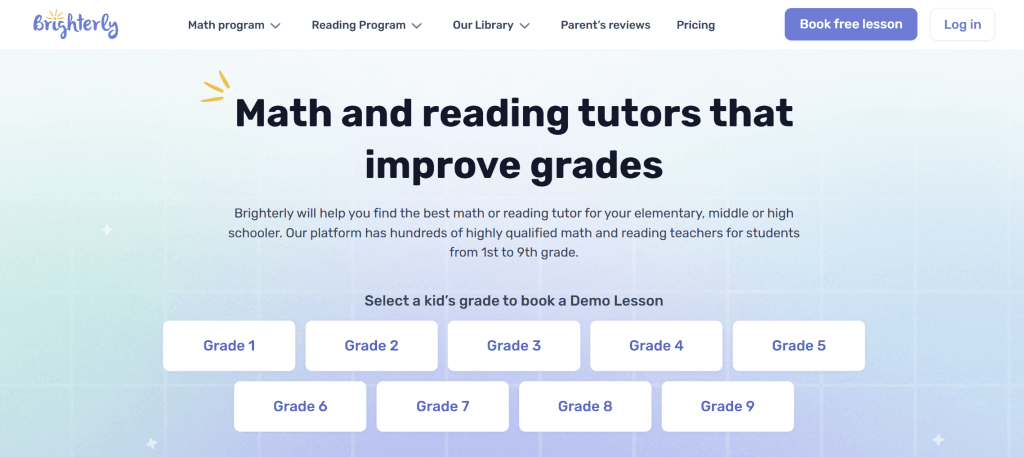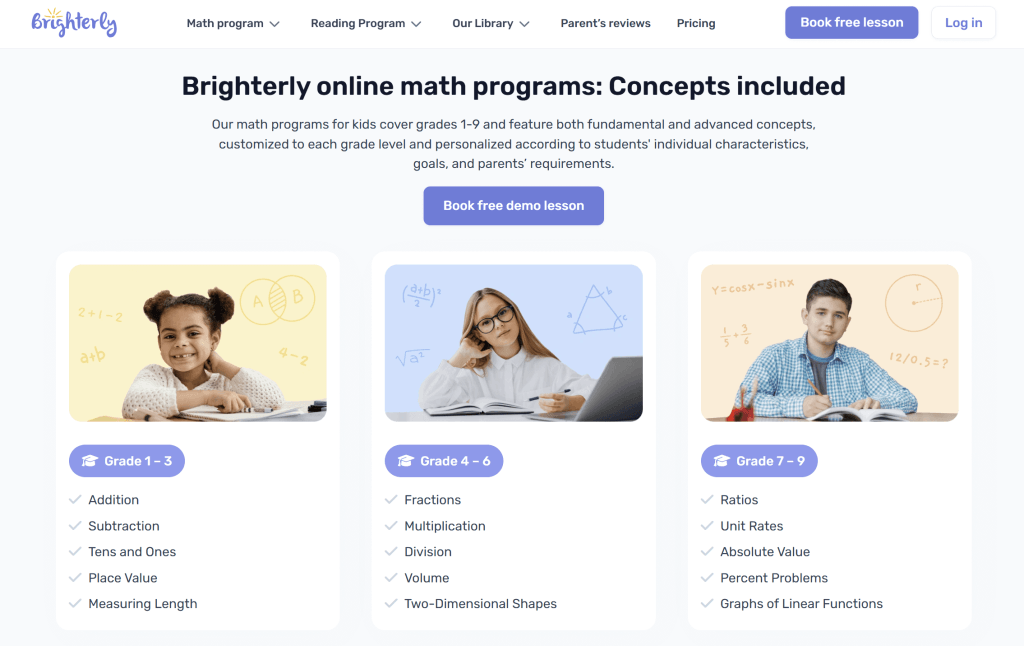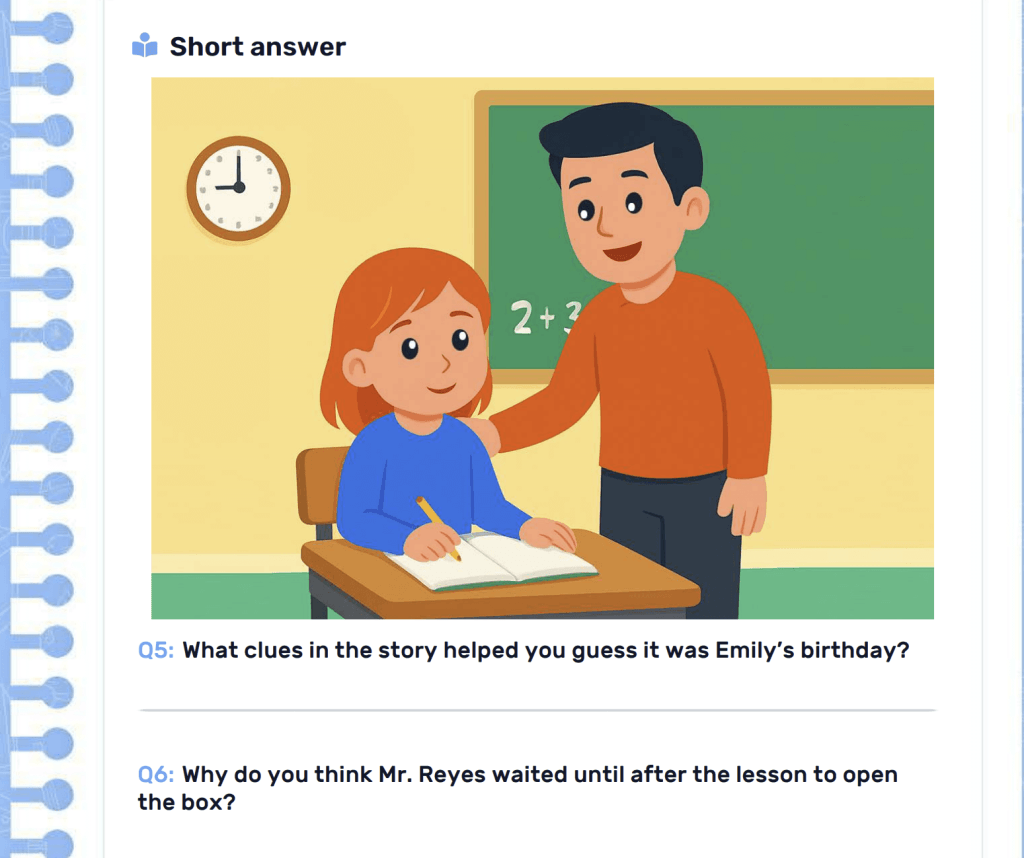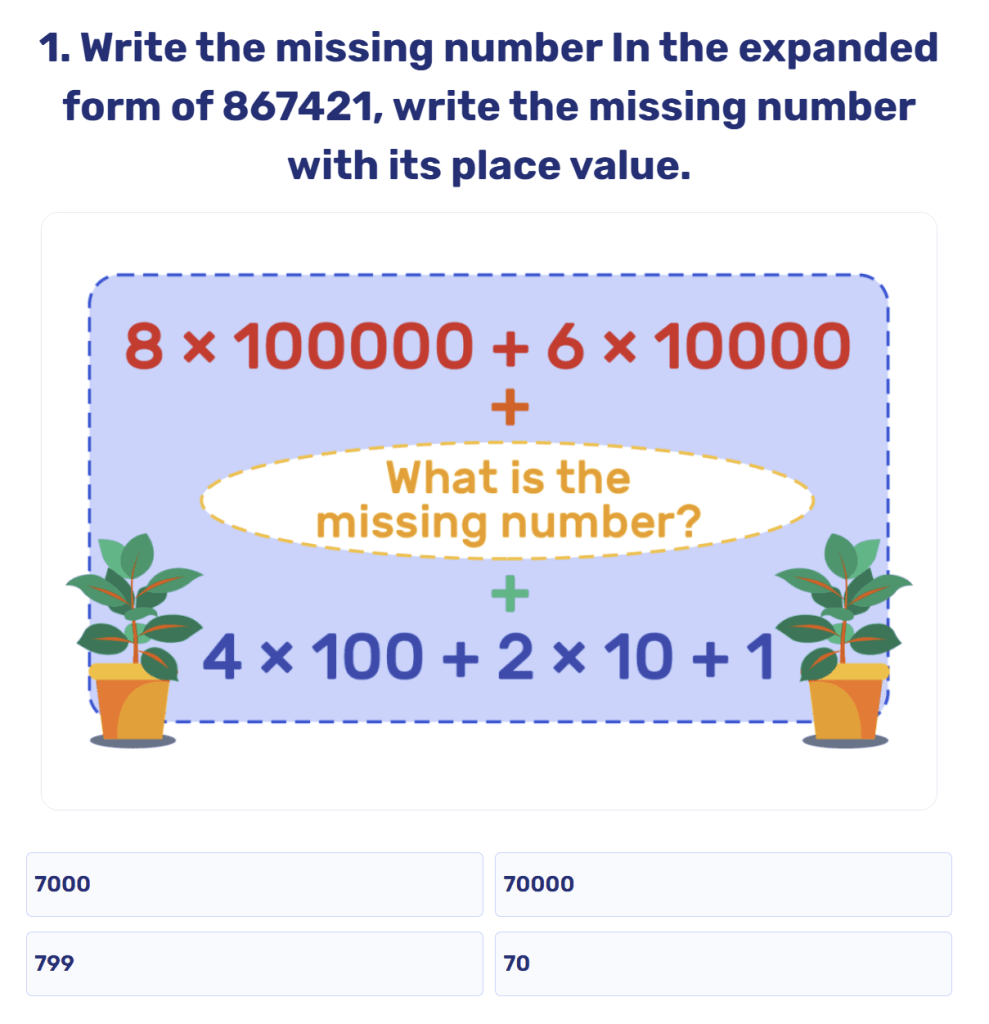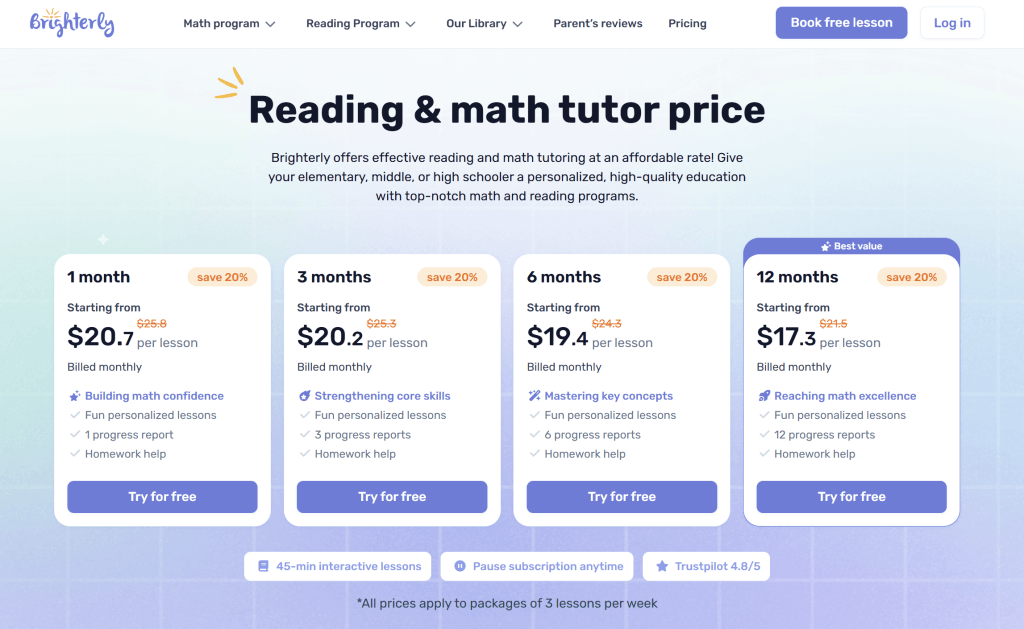15 Best Online Course Platforms 2026
reviewed by Jo-ann Caballes
Updated on October 27, 2025
Looking for the best online course platforms in 2026? Here I’ve ranked the top 15 options for parents whose children need educational support, learners looking to boost their skills and qualifications, and course creators searching for easy, intuitive solutions.
Key points
- Websites such as Udemy, Coursera, edX, and NexGen Learning offer courses in diverse topics, while others, like Skillshare, Khan Academy, and Codecademy, are focused on specific subjects.
- Platforms, such as LearnWorlds, Teachable, and Podia, provide flexible options for educators and trainers to create and sell online courses, and products, like Thinkific, Moodle, Academy of Mine, and LearnDash, supply full-scale LMSs with course modules.
- Meanwhile, Brighterly stands out as the best online course platform for 1:1, fully personalized math and reading learning for grades 1-9.
Exploring alternatives?

Comparison of online course platforms for users
Best for |
Distinct features |
Custom |
Cost |
Trustpilot score |
|
| Brighterly | 1:1, personalized math & reading tutoring for grades 1-9 |
Individualized learning plan Professional, fun teachers Common Core alignment STEM focus Award-winning curriculum |
✅ |
From $17.30/lesson Free first lesson Free tests & worksheets |
4.4 |
| Udemy | Diverse online courses |
26,000+ video courses Unlimited topics |
❌ Prerecorded videos |
Varies by course Subscription plan from $14/month |
1.8 |
| Skillshare online course platform | Creative skills |
30,000+ video courses Focus on creative subjects |
❌ Prerecorded videos |
From $13.99/month | 3.8 |
| Coursera | University-level courses & degrees |
10,000+ online prerecorded courses Classes developed by 350+ leading universities |
∼ The platform helps you build a learning path, but materials are prerecorded. |
$59/month for individual use | 1.5 |
| Khan Academy | Free student courses |
PreK-college level coverage Core & supplemental academic subjects |
❌ Prerecorded videos |
Free | 3.5 |
| edX online course platform with a certificate | Professional development |
Individual courses Certificate programs Executive education Online degrees |
∼ Varies by course or program |
From $90/course | 1.4 |
| Codecademy | Computer science topics |
Computer science-dedicated courses Various skill levels Certifications |
∼ Some plans offer Skills Path & Career Path. |
From $0/month | 2.7 |
| NextGen Learning | Broad course catalog |
Self-paced video courses Technical & creative subjects |
❌ Prerecorded videos |
From $30/course or $65/year | 4.6 |
Comparison of online platform for courses creation
Best for |
Distinct features |
Custom |
Cost |
Trustpilot score |
|
| LearnWorlds | Creators & entrepreneurs |
Intuitive course content creation software Different content format support |
✅ | From $24/month + $5/enrollment | 4.7 |
| Thinkific | Academies & small businesses |
Drag-and-drop tools Marketing & analytics features |
✅ |
From $49/month Free trial |
2.6 |
| Teachable online course creation software | Simple solutions |
User-friendly interface Advanced downloadable creation tools |
✅ |
From $89/month 7-day free trial |
3.1 |
| Moodle | Online schools |
Full LMS platform Educator-specific course creation tools |
✅ | Free (open-source) or from $150/year | 2.1 |
| Podia | All-in-one solutions |
Intuitive course generation tools Marketing & sales features |
∼ Limited |
From $39/month | 3.3 |
| Academy of Mine online course platform | Professional training |
Instructional design & development Customization |
✅ | From $999/month | N/A |
| LearnDash | WordPress-based course websites |
Drag-and-drop course creation software WordPress compatibility |
✅ | From $199/year | 4.6 |
The best platforms for online courses for users
- Brighterly: 1:1, personalized math and reading tutoring
- Udemy: Diverse online courses
- Skillshare: Creative skills
- Coursera: University-level courses and degrees
- Khan Academy: Free student courses
- edX: Professional development
- Codeacademy: Computer science topics
- NextGen Learning: Broad course catalog
Brighterly online course platform for kids and teens
The Brighterly math and reading platform is the best online course platform for math, reading, and ELA for students in grades 1-9. What makes it stand out from competitors is the highly individualized approach that matches the precise level, requirements, and expectations of each student and their family.
Brighterly features
- 1:1, student-tailored, real-time math and reading tutoring
- Beyond excellent math and reading tutors
- Rich free educational resources
1:1, student-tailored, real-time math and reading tutoring
The Brighterly reading and math program follows a unique learning path for each student, considering their grade and personality. For example, a math online course for 1st grade students may focus on game-based learning, while a 3rd grade class might provide practical tips on how to memorize multiplication tables.
The Brighterly curriculum follows the US state standards, with the math curriculum being STEM-focused. Once your child completes a free demo lesson, the Brighterly team evaluates their needs to match them with the best tutor. Lessons are delivered in 1:1, customized, interactive tutoring sessions.
Beyond excellent math and reading tutors
With Brighterly tutors, a student is sure to work with experts instead of generalists. All tutors hold at least a Bachelor’s degree and 5-10 years of experience in the subject. As trained pedagogists, they know how to accommodate their teaching strategy in real time.
Brighterly reviews continuously praise the personalized learning path, tutors’ friendliness, and improvement in students’ knowledge, as you can see on Trustpilot.
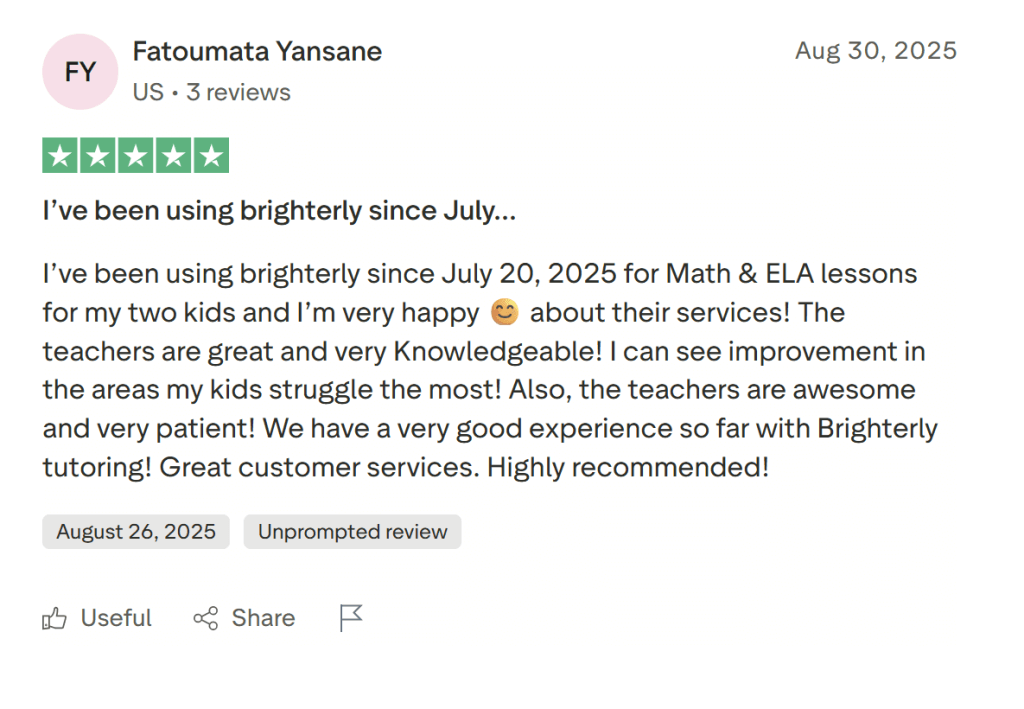
Rich free educational resources
To boost value for families, Brighterly has absolutely free math worksheets and reading worksheets that don’t require a paid account with the online class platform. Learning resources are organized by grade level and topic so that children can practice new skills gained at school or during tutoring sessions with ease. The worksheets benefit from interesting visuals and real-life examples.
The Brighterly online courses platform also provides free math tests and reading tests. Parents can use them to assess their child’s initial level or to check progress throughout tutoring.
Note: Free tests available on the Brighterly website are far from the only way to track progress. Tutors provide continuous informal feedback as well as formal monthly progress reports.
Similar to worksheets, Brighterly tests aim to be both fun and effective.
Brighterly pricing
Brighterly pricing depends on the bundle you buy but is always affordable. The cost starts at $17.30/lesson with a 12-month plan for 3 classes/week, which is much below the average tutoring rates per hour in the US.
Brighterly pros
- Personalized math and reading comprehension learning with expert tutors
- 1:1 interaction with tutors so you can ask questions and interact
- Flexible course packages with extra benefits, including live support, learning reports, lesson recordings, and a 100% refund for unused lessons
Brighterly cons
- Not free
- Only for students between 1st and 9th grade
Udemy online video course platform
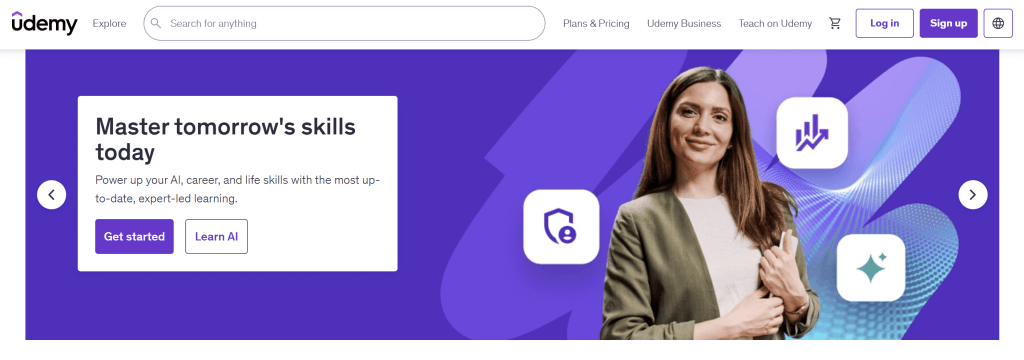
The Udemy online course platform works as a marketplace with thousands of courses covering a wide range of topics, from web development to business management.
Instructors create courses and publish them on the platform, so students can purchase what they need and study in their own time. Learners have complete freedom in what they want to study and how they want to get started.
Udemy features
- 26,000+ instructor-led video courses
- Unlimited course topics for all ages
- Student-led learning
Udemy pricing
Each course has its own price, with regular sales. If you’re planning to use Udemy continuously, you may benefit from a Personal Plan that costs $12.60/month for access to all on-demand courses. The plan comes with a 7-day free trial.
Udemy pros
- A wide range of courses for children and adults
- Good for career development
- Free trial available
Udemy cons
- Not free
- No live instructor feedback
- Lack of structure for continuous learning
Skillshare online classes platform
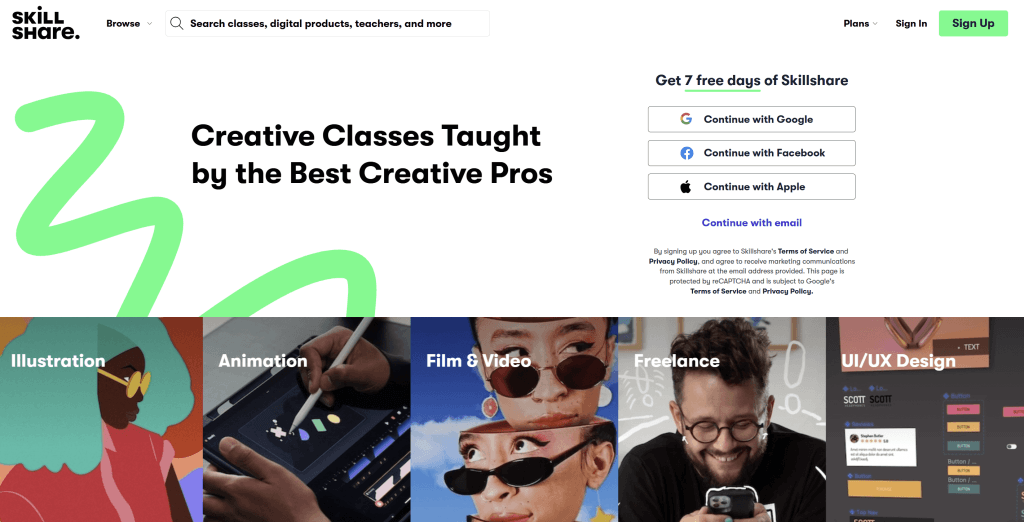
With over 30,000 classes and 9,000 teachers, Skillshare is one of the best online course platforms for developing creative skills such as painting, UX/UI design, photography, social media, marketing, and creative writing.
Before you sign up, you can check the courses’ introduction pages to see the level, prerequisites, and learning outcomes. Skillshare hosts Live Sessions, a digital event series for students to interact with course creators. This makes it different from other online learning resources.
Skillshare features
- 30,000+ creative online classes
- Curated course sequences for complete learning paths
- Industry icons as teachers
Skillshare pricing
To access the courses after a 7-day free trial, you need to pay $13.99/month for a Skillshare membership.
Skillshare pros
- Good for creative skills
- Flexible learning
- Access to a community of fellow creatives
Skillshare cons
- Only creative topics
- Limited live events
Coursera online course platform with certificate

As an online classes platform and marketplace, Coursera partners with 350+ world-class universities and industry-leading companies to deliver more than 10,000 courses.
Learners can opt for university courses, certificate programs, or online degrees, all delivered by qualified instructors. Learners get to set career goals and experience levels. The platform matches them with relevant courses. For example, if you’re wondering how to become an online tutor, you’ll be matched with teaching and tutoring skills courses.
Coursera features
- University-level classes with certificates
- Online degrees
- Different teaching resources and assignments, including on-demand videos, quizzes, and worksheets
Coursera pricing
With a free account, you can view the first module of each course. Meanwhile, Coursera Plus subscription costs $59/month, and there is a 7-day free trial. With Coursera Plus, you’ll get certificates to use when applying for jobs or universities.
Coursera pros
- Free access to the first course module
- Wide range of courses and certificates
- Courses developed by university professors and business experts
Coursera cons
- No live feedback from instructors
- No free long-term learning
Khan Academy free online course platform
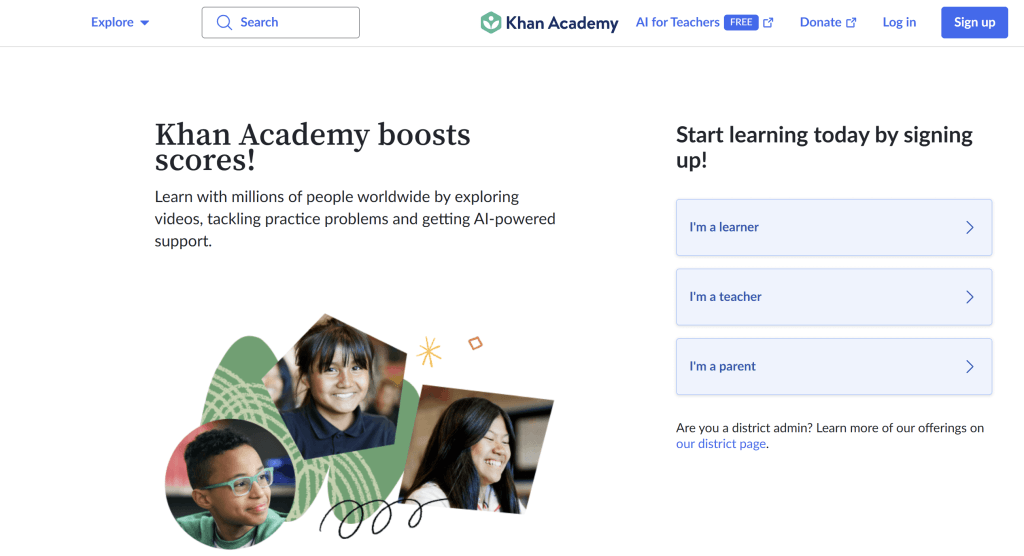
The Khan Academy review positions it as one of the top online course platforms for the free classes that it offers in multiple academic subjects. Khan Academy provides prerecorded video courses in math, reading, language arts, science, social studies, and life skills. It serves the needs of students from PreK to 12th grade and even in college. Older learners can take advantage of test prep, computing, and economics classes.
Khan Academy uses different formats, including instructor-led videos, exercises, quizzes, and articles. The online course platform doesn’t provide an individualized learning plan, so it requires strict parental guidance, especially for younger students.
Khan Academy features
- PreK-college level courses
- Coverage of core and additional school subjects
- Free unlimited access to educational content
Khan Academy pricing
Khan Academy is entirely free to use.
Khan Academy pros
- Free
- Wide range of school subjects
- Learning dashboard to track progress
Khan Academy cons
- No live classes
- Difficult for children to stay motivated
edX platform for online classes
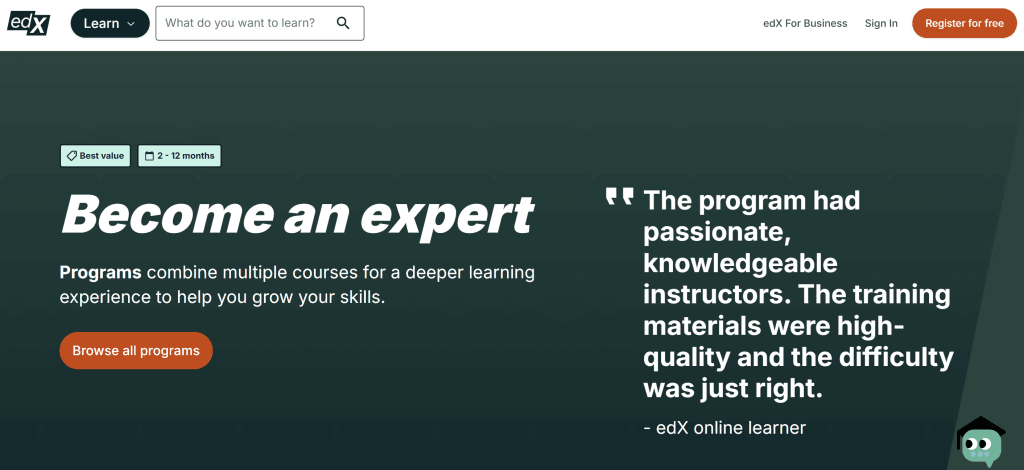
edX is one of the best online course websites for continuing education. The platform offers online education in various subjects, such as finance, computer science, AI, and leadership. It provides an opportunity to earn a Bachelor’s, Master’s, or Doctorate degree from well-known international universities.
With edX, students can choose the format that works best for their needs. Options include individual courses, certificate programs, executive education, and online degrees. Because of this diversity, I rank edX as a top online course platform with certificate options.
edX features
- Diverse education formats
- Multiple continuing education options
- Programs offered by renowned educational institutions
edX pricing
The cost of individual edX courses is typically $90-$300. There is an option to gain access to materials with a free audit track, but you cannot get a certificate. Meanwhile, higher education degrees cost thousands of dollars.
edX pros
- Well-assorted adult learning topics
- Good option for professional development
- Some affordable courses
edX cons
- Not a good fit for younger learners
- Prices can be prohibitively high
Codecademy online course platform
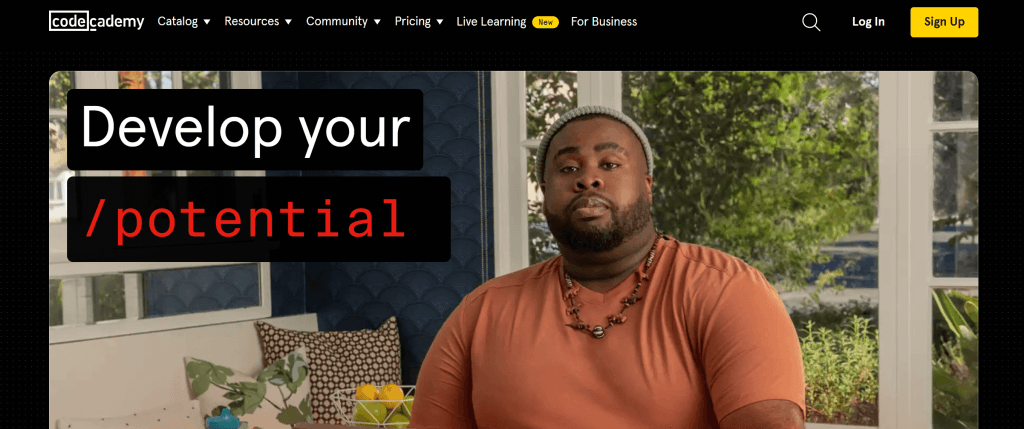
Among the best online course platforms, Codecademy grabbed my attention for its focus on tech-related topics, including AI, data, automation, coding, cybersecurity, and others. The website offers beginner, intermediate, and advanced classes to meet the needs of students, individuals, and businesses.
Codecademy has Career Paths and Skill Paths that guide students in what they need to learn and in what order to realize their full educational and professional potential in technical subjects.
Codecademy features
- Dedicated to computer science
- Appropriate fit for students and adult learners
- Guided learning path for personalized learning
Codecademy pricing
Codecademy offers a free plan to gain basic skills. The most popular plan costs $14.99/month, while the Pro subscription with personalization features amounts to $19.99/month.
Codecademy pros
- Technical skills focus
- Available certifications
- Affordable pricing
Codecademy cons
- No classes for young students
- Lack of courses beyond computer science
NextGen Learning platform for online classes
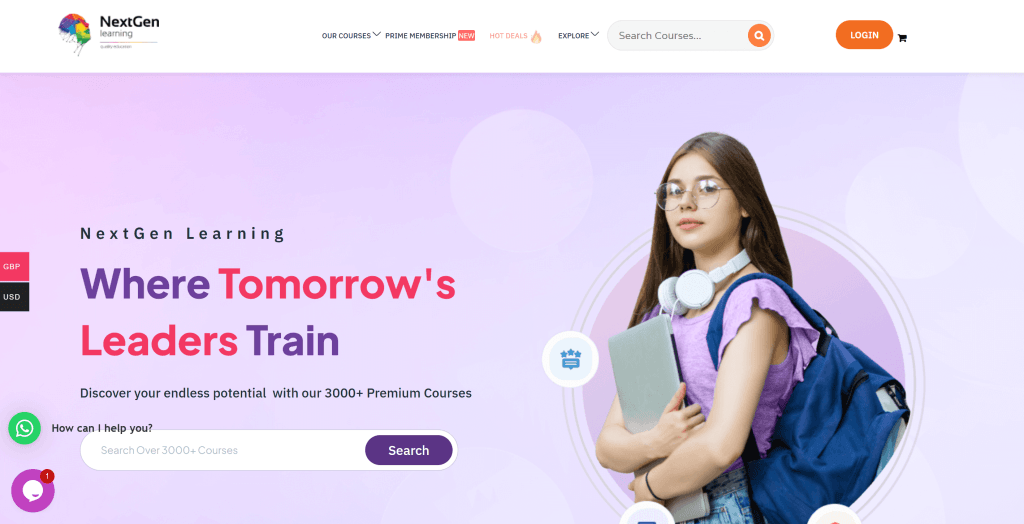
I consider NextGen Learning one of the top online course platforms for the diverse topics it brings to aspiring students and professionals. You can choose from technical subjects, such as business, accounting, IT, and project management; through health-related courses, such as mental health, first aid, and nutrition; all the way to creative classes, such as makeup, beauty, and design.
All in all, learners can select from over 3,000 courses. They can claim completion certificates to advance their career.
NextGen Learning features
- Well-diversified course catalog
- Student and professional classes
- Course organization by Career Path
NextGen Learning pricing
The price of individual courses starts at about $30, but you can get an annual membership from $65/year for access to all classes.
NextGen Learning pros
- From creative to technical topics
- Good fit for students and professionals
- Reasonable pricing
NextGen Learning cons
- No learning personalization
- No free education options
The best platform to create online courses for course creators
- LearnWorlds: Creators and entrepreneurs
- Thinkific: Academies and small businesses
- Teachable: Simple solutions
- Moodle: Online schools
- Podia: All-in-one solution
- Academy of Mine: Professional training
- LearnDash: WordPress-based course websites
LearnWorlds online course builder
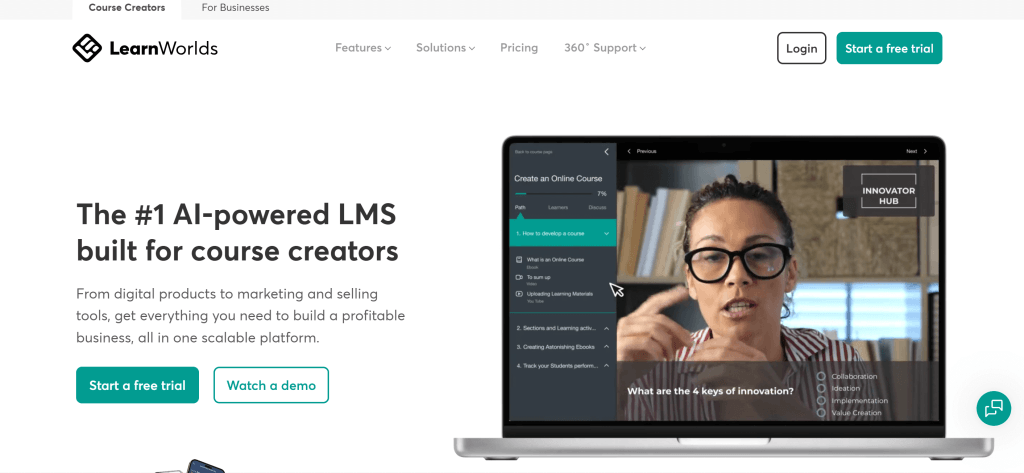
LearnWorlds offers all-in-one online course creation software entrepreneurs can easily use to develop classes. In a relatively short time, you can build your own digital academy to train your team, educate customers, or share knowledge with various audiences.
Based on LearnWorlds reviews, the platform appears to be intuitive, and support is available when needed. As a teacher myself, I think this online course platform could work well for educators leveraging homeschooling resources or other learning tools.
LearnWorlds features
- Innovative tools facilitating online course creation
- Interactive video classes
- Support for different content types, including videos, eBooks, and quizzes
LearnWorlds pricing
LearnWorlds pricing starts at a subscription fee of $24/month plus $5/user enrollment.
LearnWorlds pros
- Easy-to-use content creation tools for branded online courses
- Compatibility with different multimedia formats, integrations, and educational activities
- Well-developed marketing tools
LearnWorlds cons
- Not the best free online course builder (no free plan)
- Potentially steep learning curve for beginner course creators
Thinkific online course creation platform
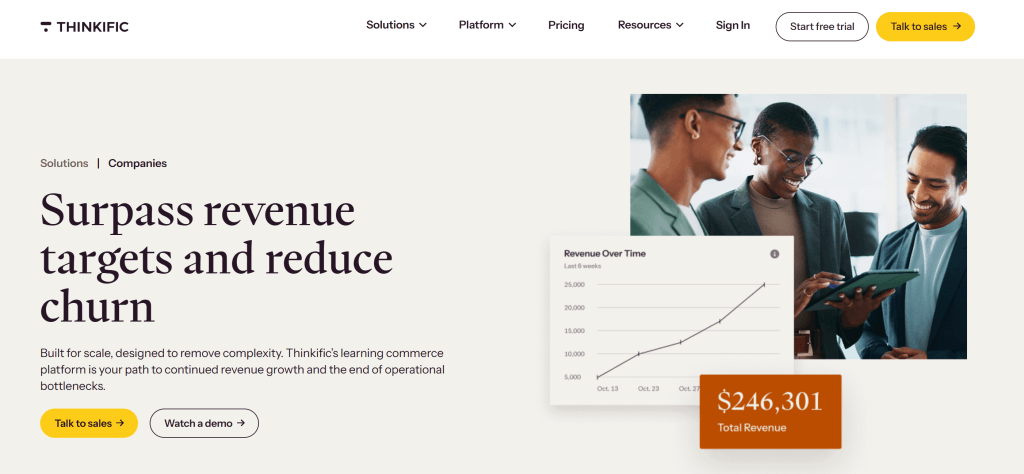
Thinkific is one of the most well-known online course platforms for those who want to sell courses, digital products, downloadables, and memberships. The tools feature a drag-and-drop course builder, which makes the website a good fit for academic organizations and small companies with limited human resources. Specifically, it’s a good fit for educators who are increasingly looking for learning management system (LMS) platforms, according to recent education trends and statistics.
Besides course creation, Thinkific’s sales and marketing features stand out. The Learning Communities Platform offers tools to engage and retain students. For example, the platform features in-app notifications to drive students to the course website, member profiles to personalize learners’ experiences, and virtual rooms to post course updates.
Thinkific features
- Drag-and-drop tools
- Courses, communities, downloads, memberships, coaching materials, and webinars creation features
- Marketing and commerce tools
Thinkific pricing
The cost of Thinkific ranges between $36 and $149/month, including email marketing campaigns integrations, affiliate marketing, and detailed analytics. There is a free trial.
Thinkific pros
- Student retention, thanks to learning community and marketing features
- Different types of content, such as digital downloads, live events, community platforms, quizzes, and assignments
- Flexible pricing
Thinkific cons
- Difficult to figure out how it works, especially for beginners
- Lack of a free plan
Teachable virtual training platform
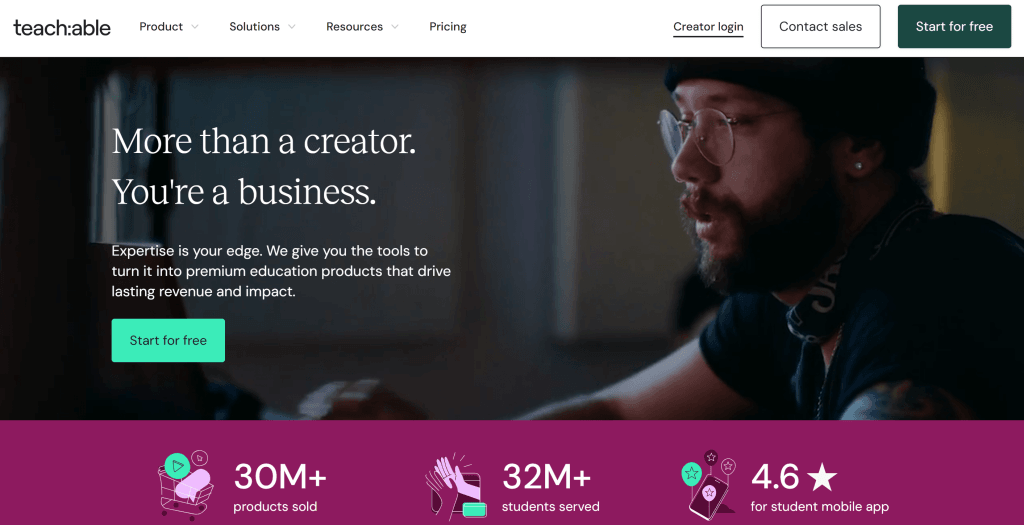
My online course platform comparison highlights Teachable for its tools simplicity as a no-code course building website. You can create online courses and digital downloads or manage your community memberships.
The platform’s user-friendliness makes it a good choice for educators, especially those looking to launch digital downloads. After you become an online tutor, you can use Teachable to compile your worksheets into a PDF for your website. The platform supports video, images, spreadsheets, and more.
Teachable features
- User-friendly, no-code course creation
- Digital download building features
- Learning Community creator
Teachable pricing
The pricing of Teachable plans starts at $29/month and goes up to $309/month. The online course platform creator offers a 7-day free trial.
Teachable pros
- No-code and intuitive interface
- Wide range of content, such as spreadsheets, audio, stock photos, ebooks, and email templates
- Excellent for creating worksheets
Teachable cons
- Potential learning curve
- Not a free online course platform
Moodle online course platform
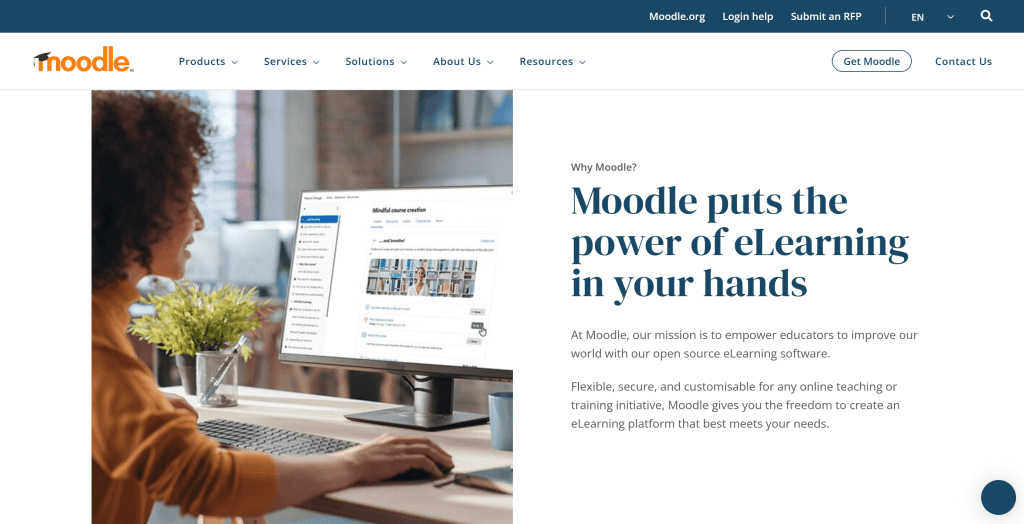
Moodle offers one of the best LMS platforms (Moodle LMS) that can help K-12 and beyond educators create courses and manage classes. Teachers can grade assignments, track learners’ progress, and give access to the course for a personalized learning approach.
The best advantage of Moodle is its customizable features. Teaching institutions can choose plugins to change enrollment methods. They can work with Moodle experts to create interactive teaching experiences, such as quizzes, assignments, or games. The Moodle team has thought of all teachers, whether teaching online, offline, or in a blended manner.
Moodle features
- Comprehensive learning management systems features
- Educator-dedicated course creation
- Open-source or hosted solutions
Moodle pricing
Moodle can be used as an open-source software with self-hosting and no license fees. Alternatively, paid plans start at $150/year.
Moodle pros
- Good for teaching institutions for its customizability and flexibility
- Supplementary tools for managing online and offline education
- Free to use as an open-source platform (with additional hosting, customization, and technical support fees)
Moodle cons
- Too technical and difficult to figure out without help
- Steeper pricing for larger academic institutions
Find out what Jaime Smith, Founder and CEO of OnlineG3, an education company for gifted and 2E students, has to say about the online course platform:
At OnlineG3, we have been using Moodle as our course management system for the last 15 years.
It’s open source, which means educators can get started with a simple Moodle installation on a personal website for minimal cost. Plus, there are many developers worldwide who continue to design unique (and mostly free) plugins that allow instructors to customize their own Moodle installation for a specific purpose or audience. There is a bit of a learning curve, but thankfully Moodle offers free online tutorials to help teachers get started.
Podia online course builder

When I compare online course platforms for creators, I am amazed by the comprehensive solutions that Podia offers to different users, including K-12 teachers and tutors.
The website requires no coding skills for creating engaging, attractive online courses. Moreover, educators can boost students’ dedication via built-in discussion forums, where they can post announcements, answer questions, share video links, and facilitate communication. Podia offers marketing and sales tools so that you can sell your best online courses on the same platform.
Podia features
- Easy, no-coding online course creator
- Discussion forum feature
- Marketing and sales capabilities
Podia pricing
The cost of Podia starts at $33/month with 5% transaction fees, after a 30-day free trial.
Podia pros
- Intuitive online course creation software
- Excellent fit for teachers and educators
- Extended free trial
Podia cons
- Limited customization compared to other best online course platforms
- No free forever plan
Academy of Mine online course platform
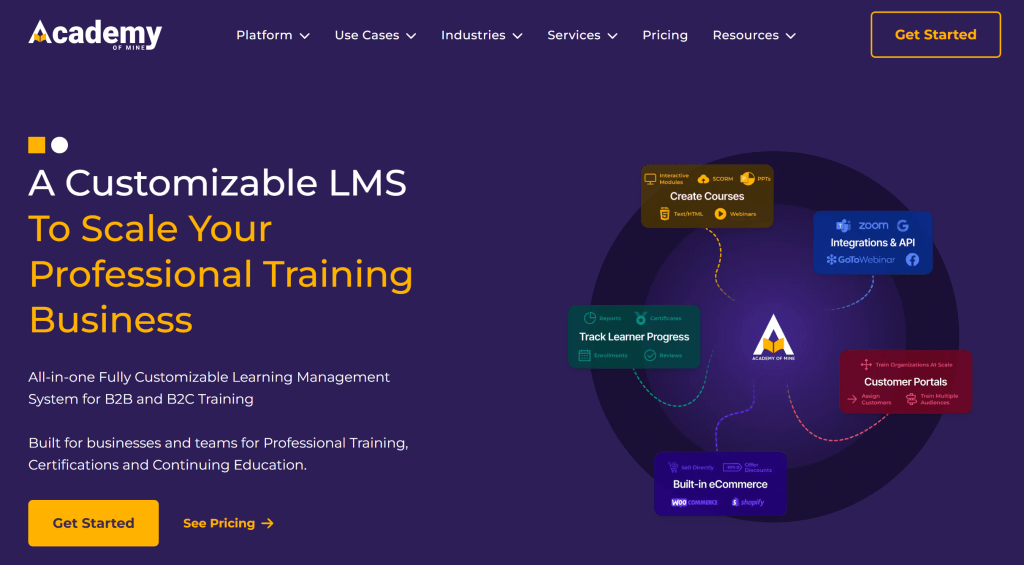
Academy of Mine is another customizable LMS platform focusing on professional training, continuing education, and B2B training enterprises. While it can be used by K-12 teachers, they might find it more complicated than necessary.
As an online course builder, Academy of Mine offers tools and services for tailored e-learning solutions. The platform supports instructional design and development for the creation of self-paced courses, instructor-led classes, and different webinars. It makes it easy to migrate courses from other websites.
Academy of Mine features
- Design and development services
- Excellent customization
- Migration support
Academy of Mine pricing
As it targets professional trainers rather than K-12 educators, Academy of Mine is significantly more expensive than other top online course platforms, with prices starting at $999/month.
Academy of Mine pros
- Great fit for professional training
- Superior customization
- Easy migration from other platforms
Academy of Mine cons
- Poor fit for early education specialists
- No free trial
LearnDash online class platform
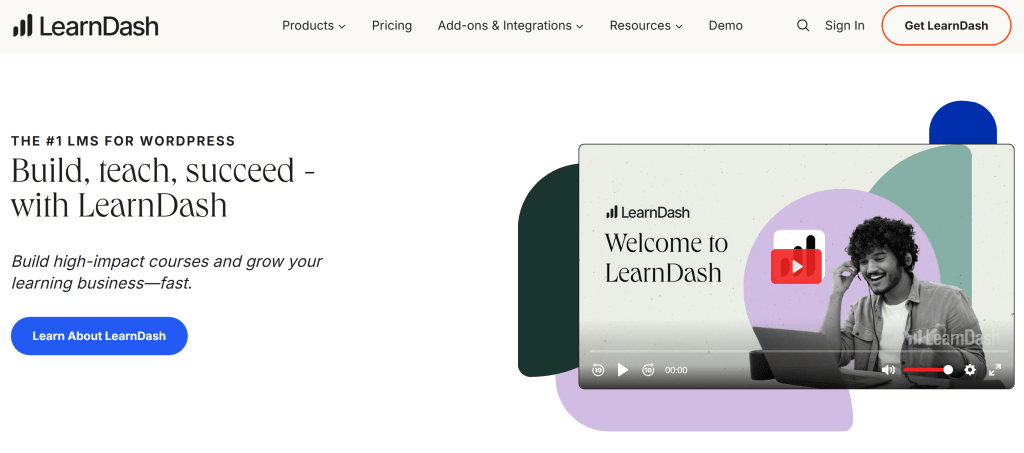
Finally, my review classifies LearnDash as the best online courses platform for educators and creators who host their classes on WordPress websites.
LearnDash offers drag-and-drop modules for creating and designing course content without coding. Additionally, you can sell online courses via one-time fees, subscriptions, and memberships for the best revenue generation model for your goals.
LearnDash features
- Drag-and-drop course builder
- AI course and quiz builder
- Comprehensive LMS platform
LearnDash pricing
The cost of LearnDash starts at $199/year for one website, with no free trial.
LearnDash pros
- No-coding course creation
- Marketing and sales facilitation
- Ideal for WordPress websites
LearnDash cons
- No usability beyond WordPress
- Lack of a free trial
How to choose the best online course platform
To select the best platform for online courses, you should focus on available features, ease of use, customization level, compatibility with other educational and training tools you’re using, pricing, and – of course – your specific needs.
“My advice is to find the best online course platform that presents lots of shorter questions and then immediately tells you if you got the answer right or wrong,” says Jed Macosko, Professor at Wake Forest University and President at AcademicInfluence. He adds:
If you are looking for a platform that will work well even when the students are more motivated to check a box that they have finished their assignments, then you will have to look hard.
Most of the platforms allow students to simply screenshot the question and paste the screenshot into ChatGPT to get the right answer. The only way I have found to avoid this is to find a platform that uses shorter questions that are possible to answer just by having read the question and just having answered previous questions (and finding out which answers were right or wrong).
Factors for choosing an online course platform
- Learning objectives: Decide whether you aim to boost skills or earn a recognized certification.
- Course format: Self-paced courses offer flexibility, while instructor-led classes provide real-time interaction and Q&A opportunities, crucial for younger learners.
- Instructors: Qualified, experienced teachers might charge more, but they offer well-pronounced benefits over self-proclaimed experts.
- Course level: Choose the right level for your current skills, ideally after taking a test.
- Platform user-friendliness: Go for an online class platform that is easy to use for a smooth experience.
- Cost: Select a platform that fits your budget, taking into account one-time fees and recurring payment costs.
Conclusion: Which online course platform is best?
These are the 15 best online course websites for learners and creators. With so many options, you’re guaranteed to find what you’re looking for, whether you want to gain new skills or share them with others.
- If you need to develop diverse skills, have a look at Udemy, Coursera, edX, and NextGen Learning.
- If you require more specialized knowledge, try Skillshare for creative topics, Khan Academy for school subjects, and Codecademy for computer science curriculum.
- If you want to create your online courses to sell, check out LearnWorlds, Thinkific, Teachable, Moodle, Podia, Academy of Mine, and LearnDash.
- And if you’re looking for the best way to turn your child into a math and reading wizard, Brighterly is your go-to solution.
With Brighterly, your family benefits from:
✅ Private, individualized math and reading tutoring at convenient times
✅ Highly qualified teachers with superb personal skills
✅ Affordable pricing and free resources
Ready to try the best of the best online course platforms? Book free lesson now to uncover the full potential of 1:1, customized tutoring.

